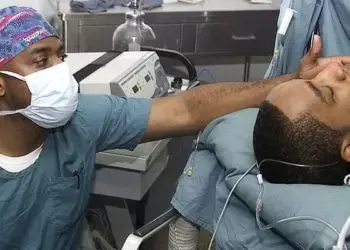- Home
- Medical news & Guidelines
- Anesthesiology
- Cardiology and CTVS
- Critical Care
- Dentistry
- Dermatology
- Diabetes and Endocrinology
- ENT
- Gastroenterology
- Medicine
- Nephrology
- Neurology
- Obstretics-Gynaecology
- Oncology
- Ophthalmology
- Orthopaedics
- Pediatrics-Neonatology
- Psychiatry
- Pulmonology
- Radiology
- Surgery
- Urology
- Laboratory Medicine
- Diet
- Nursing
- Paramedical
- Physiotherapy
- Health news
- Fact Check
- Bone Health Fact Check
- Brain Health Fact Check
- Cancer Related Fact Check
- Child Care Fact Check
- Dental and oral health fact check
- Diabetes and metabolic health fact check
- Diet and Nutrition Fact Check
- Eye and ENT Care Fact Check
- Fitness fact check
- Gut health fact check
- Heart health fact check
- Kidney health fact check
- Medical education fact check
- Men's health fact check
- Respiratory fact check
- Skin and hair care fact check
- Vaccine and Immunization fact check
- Women's health fact check
- AYUSH
- State News
- Andaman and Nicobar Islands
- Andhra Pradesh
- Arunachal Pradesh
- Assam
- Bihar
- Chandigarh
- Chattisgarh
- Dadra and Nagar Haveli
- Daman and Diu
- Delhi
- Goa
- Gujarat
- Haryana
- Himachal Pradesh
- Jammu & Kashmir
- Jharkhand
- Karnataka
- Kerala
- Ladakh
- Lakshadweep
- Madhya Pradesh
- Maharashtra
- Manipur
- Meghalaya
- Mizoram
- Nagaland
- Odisha
- Puducherry
- Punjab
- Rajasthan
- Sikkim
- Tamil Nadu
- Telangana
- Tripura
- Uttar Pradesh
- Uttrakhand
- West Bengal
- Medical Education
- Industry
Intradialytic exercise may improve survival rates in adult patients receiving hemodialysis

Patients with kidney failure have a high mortality rate. There is an exponential increase in the number of patients experiencing kidney failure requiring treatment with life-saving kidney replacement therapy (KRT), including hemodialysis (HD), peritoneal dialysis (PD) or kidney transplantation.
Researchers have found inj a new study that Intradialytic exercise may improve survival rates in adult patients receiving hemodialysis.
The new study has been published in the BMC Nephrology.
Patients with kidney failure have a high mortality rate. This study aimed to evaluate the effect of intradialytic exercise on survival in patients receiving hemodialysis (HD).
In this randomized controlled trial conducted in a HD center in Iran, adult patients receiving chronic HD were randomized to intradialytic exercise (60 min) in the second hour of thrice weekly dialysis for 6 months (intervention) or no intradialytic exercise (control). The primary outcome was survival rate at 12 months. Secondary outcomes were serum albumin, hemoglobin, hematocrit, red blood cell count, serum calcium, serum phosphorous, parathyroid hormone, physical function (6-min walk test) and nutritional status (Geriatric Nutritional Risk Index) during the first 6 months. The trial follow-up period was 12 months.
Results
The study included 74 participants (44 males) with an age average of 64 ± 12 years old and a dialysis history of 27 ± 12 months, randomized to intervention (n = 37) or control (n = 37). Compared with controls, 1-year survival was higher in the intervention group
The hazard ratio in univariate analysis in intervention group was 0.17 compared to that in control group.
During the 6-month intervention period, significant between-group changes were observed in all secondary outcomes between the intervention and control groups.
Intradialytic exercise performed for at least 60 min during thrice weekly dialysis sessions improves survival in adult patients receiving HD.
Reference:
Tabibi, M.A., Cheema, B., Salimian, N. et al. The effect of intradialytic exercise on dialysis patient survival: a randomized controlled trial. BMC Nephrol 24, 100 (2023).
Dr. Shravani Dali has completed her BDS from Pravara institute of medical sciences, loni. Following which she extensively worked in the healthcare sector for 2+ years. She has been actively involved in writing blogs in field of health and wellness. Currently she is pursuing her Masters of public health-health administration from Tata institute of social sciences. She can be contacted at editorial@medicaldialogues.in.
Dr Kamal Kant Kohli-MBBS, DTCD- a chest specialist with more than 30 years of practice and a flair for writing clinical articles, Dr Kamal Kant Kohli joined Medical Dialogues as a Chief Editor of Medical News. Besides writing articles, as an editor, he proofreads and verifies all the medical content published on Medical Dialogues including those coming from journals, studies,medical conferences,guidelines etc. Email: drkohli@medicaldialogues.in. Contact no. 011-43720751


